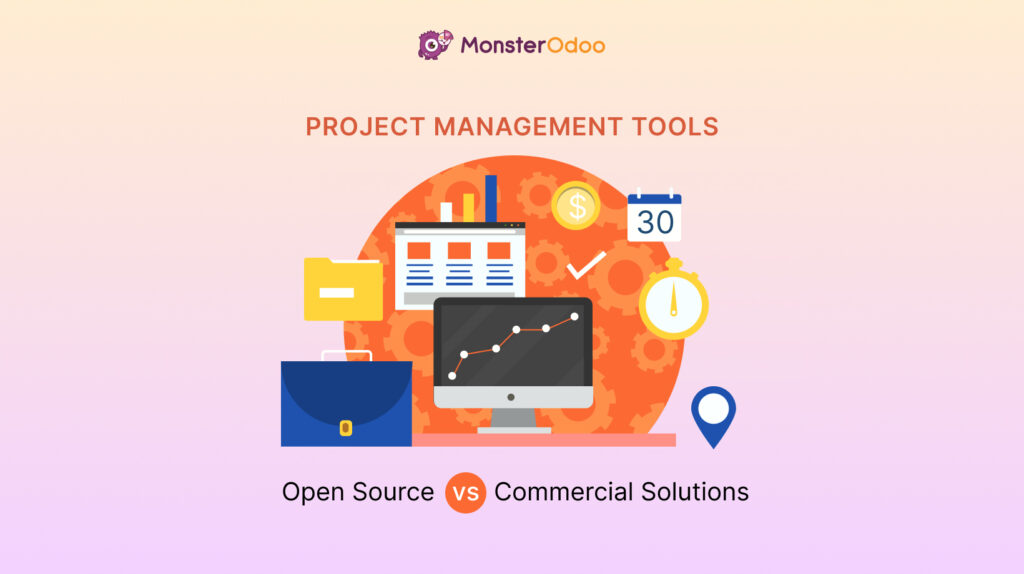In today’s fast-paced business environment, effective project management is crucial for success. Project management tools have become indispensable in helping teams plan, organize, and collaborate on projects efficiently. When it comes to choosing the right tool for your organization, you may come across two primary options: open source and commercial project management solutions. In this blog post, we will compare these two approaches to help you make an informed decision for your project management needs.

Open Source Project Management Tools:
Open source software refers to programs whose source code is freely available for anyone to use, modify, and distribute. Open source project management tools offer several advantages:
- Cost-effectiveness: One of the key benefits of open source tools is that they are typically free to use. This makes them an attractive option for organizations with limited budgets or small teams.
- Customization and flexibility: Open source tools provide the freedom to modify and adapt the software to suit your specific project requirements. This level of customization allows for greater flexibility and ensures that the tool aligns perfectly with your team’s workflow.
- Community support: Open source tools often have active user communities that contribute to their development and support. This means you can benefit from the knowledge and expertise of a large community of users, who provide assistance, share best practices, and create add-ons or plugins to enhance the functionality of the tool.
However, open source tools also come with some limitations:
- Technical expertise required: Implementing and maintaining open source tools may require technical knowledge. Setting up and troubleshooting issues might be more challenging compared to commercial solutions, which usually come with dedicated customer support.
- Limited support: While user communities can be helpful, there might be limitations in terms of timely support for specific issues. Relying solely on community support may result in longer resolution times.
Best project management tools by MonsterOdoo, click here to try Odoo Apps
Commercial Project Management Tools:
Commercial project management tools are proprietary software solutions offered by vendors. They offer several advantages that make them popular choices among businesses:
- Comprehensive features: Commercial tools often provide a wide range of features and functionalities to support project planning, scheduling, task management, collaboration, and reporting. These tools are designed to cater to the diverse needs of different industries and project types.
- User-friendly interfaces: Commercial tools prioritize user experience and typically offer intuitive interfaces. This makes them easy to learn and use, reducing the learning curve for team members and improving overall productivity.
- Dedicated customer support: When you opt for a commercial solution, you gain access to dedicated customer support from the software vendor. This ensures that any technical issues or queries are addressed promptly, minimizing disruptions to your project.
However, there are a few limitations to consider with commercial project management tools:
- Cost considerations: Commercial tools often come with pricing models, such as monthly or annual subscriptions. Depending on the features and the number of users, the costs can add up. It’s important to evaluate the pricing structure and ensure it aligns with your budget.
- Vendor dependency: By choosing a commercial tool, you are relying on the software vendor for updates, maintenance, and support. It’s essential to assess the reliability and reputation of the vendor to ensure long-term sustainability of the tool.
Factors to Consider When Choosing Between Open Source and Commercial Tools:
When deciding between open source and commercial project management tools, consider the following factors:
- Project requirements and complexity: Evaluate your project’s unique needs, such as the size of the team, the nature of the project, and specific features required. Determine if an open source or commercial tool better aligns with your project’s complexity and objectives.
- Budget considerations: Assess your budgetary constraints and determine if investing in a commercial tool is feasible. If cost-effectiveness is a priority, open source tools may be a more suitable option.
- Technical expertise and available resources: Consider the technical capabilities of your team and the resources available for tool implementation, customization, and ongoing maintenance. Open source tools may require more technical expertise and hands-on management.
- Scalability and future growth: Evaluate the scalability of the tool and its ability to accommodate your organization’s growth. Consider if the tool can handle increased project complexity, additional users, and integration with other business systems.
Conclusion:
When it comes to project management tools, the choice between open source and commercial solutions depends on various factors. Open source tools offer cost-effectiveness and customization but may require technical expertise. Commercial tools provide comprehensive features and dedicated support but come with a price tag. Consider your project’sspecific needs, budget, technical capabilities, and scalability when making a decision.
Ultimately, the right project management tool is the one that aligns with your organization’s unique requirements and helps streamline your project workflows effectively. Whether you choose an open source or commercial solution, MonsterOdoo provides a range of project management tools to support your team’s success. Evaluate your options, assess your needs, and make an informed decision that empowers your team to collaborate, plan, and execute projects with efficiency and precision. Please contact us for more specific consultation.



